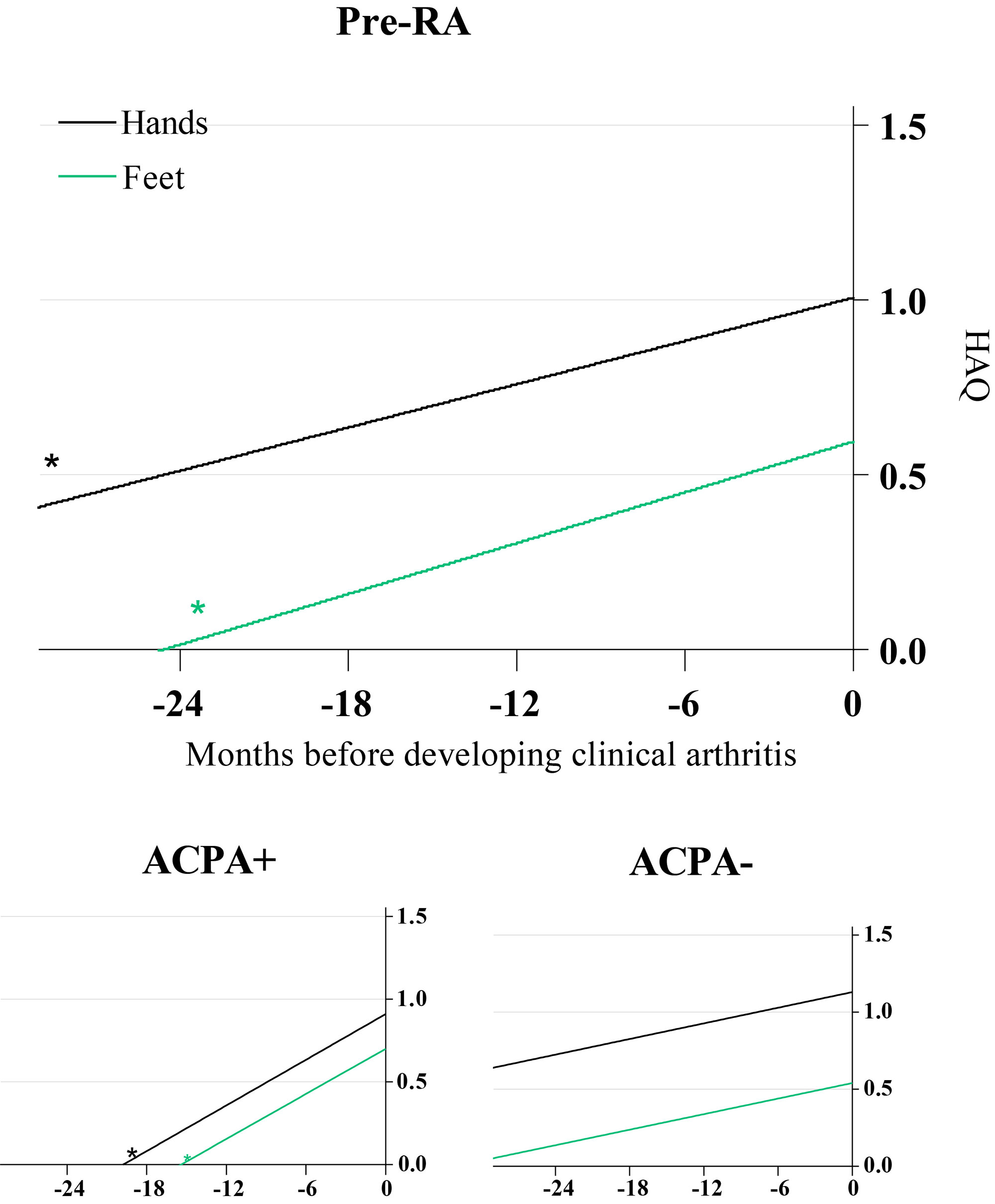Session Information
Session Type: Poster Session D
Session Time: 1:00PM-3:00PM
Background/Purpose: In the pre-arthritis phase of Rheumatoid Arthritis (RA), symptoms resulting in physical disabilities already occur. It is unknown whether functional disabilities start in hands or feet, and whether such information on functional disabilities is related to arthritis development. We aimed to study the course of functional disabilities in hands and feet during progression from arthralgia to RA, and whether questions assessing specifically these disabilities contribute to predicting progression to RA.
Methods: 524 patients with clinically suspect arthralgia were studied for development of clinical inflammatory arthritis (IA) with a median follow-up of 25 months. Functioning was measured with the Health Assessment Questionnaire Disability-Index (HAQ) at baseline and after 4,12,24 months. HAQ-items assessing hands-functioning (dressing/eating/grip) and feet-functioning (walking) were studied. In patients who developed IA, the longitudinal course of functional disabilities towards IA-development was studied, using linear mixed models with date of IA-development as timepoint zero. ACPA-stratification was applied. Associations between HAQ-questions at CSA-presentation and future IA-development were studied with cox-regression analysis including age, sex, CRP, ACPA and RF.
Results: 91 patients developed IA. In these patients, feet-functioning at presentation with CSA was less impaired than hands-functioning. Disabilities in hands rose with 0.25units/year, 95%CI=0.04-0.45, p< 0.019 towards IA-development; compared to those in the feet with 0.29units/year, 95%CI=0.08-0.50, p=0.008 (on the HAQ-scale of 0-3; Figure). Hands-disabilities were reported earlier and were more severe than feet-disabilities during the total course with an overall difference of 0.41units; 95%CI=0.28-0.55, p< 0.001. This was similar in both ACPA-subtypes. In the total arthralgia-population, a single HAQ-question involving hands-functioning (question regarding difficulties with dressing) was as predictive as total HAQ≥1 for IA-development. This was independent of regularly used clinical predictors: HR 2.3 (95%CI=1.5-3.6, p< 0.001).
Conclusion: Functional disabilities in hands precede those in feet during RA-development. A single question on difficulties with dressing adds value to risk stratification in patients with clinically suspect arthralgia and is easy to use in practice.
To cite this abstract in AMA style:
Khidir S, van Dijk B, Verstappen M, van Mulligen E, van der Helm-van Mil A. Functional Disabilities in Hands Precede Those in Feet in Patients Progressing from Clinically Suspect Arthralgia to Rheumatoid Arthritis; A Longitudinal Observational Study [abstract]. Arthritis Rheumatol. 2022; 74 (suppl 9). https://acrabstracts.org/abstract/functional-disabilities-in-hands-precede-those-in-feet-in-patients-progressing-from-clinically-suspect-arthralgia-to-rheumatoid-arthritis-a-longitudinal-observational-study/. Accessed .« Back to ACR Convergence 2022
ACR Meeting Abstracts - https://acrabstracts.org/abstract/functional-disabilities-in-hands-precede-those-in-feet-in-patients-progressing-from-clinically-suspect-arthralgia-to-rheumatoid-arthritis-a-longitudinal-observational-study/

